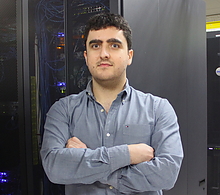 A graduate student in the Maryland Cybersecurity Center (MC2) has been awarded a prestigious fellowship from a Fortune 500 company to further his research in searchable encryption.
A graduate student in the Maryland Cybersecurity Center (MC2) has been awarded a prestigious fellowship from a Fortune 500 company to further his research in searchable encryption.
Ioannis Demertzis, a third-year doctoral student in electrical and computer engineering, has received a Symantec Research Labs Graduate Fellowship, which provides up to $20,000 to cover a year’s worth of tuition, fees and other expenses related to his graduate program.
The fellowship also offers the opportunity to engage in collaborative research with Symantec’s cybersecurity experts and complete a paid summer internship at the company’s Mountain View, California campus.
Demertzis is one of only three doctoral students awarded a Symantec fellowship in 2018. He says he intends to work with a mentor from Symantec on real, open-ended security problems that are at the intersection of security, applied cryptography and data management.
“Symantec is one of the largest software security companies and this is a highly competitive and prestigious fellowship that will allow me to continue pursuing research in an area with extremely important real-world implications,” says Demertzis. “I am very honored and excited to be selected.”
Demertzis’s research involves secure databases and applied cryptography with a focus on searchable encryption—a powerful cryptographic tool that enhances encryption by allowing efficient searches directly on encrypted data.
“Ioannis has been developing new theoretical and practical techniques for searching encrypted data that cannot fit in memory,” says Charalampos (Babis) Papamanthou, an assistant professor of electrical and computer engineering who serves as Demertzis’s adviser at Maryland.
While searchable encryption has been around since the early 2000s, Papamanthou explains, this particular aspect of the problem—searching large-scale encrypted data—has not been given the attention it deserves, especially from a practical perspective.
“It caught the eye of the fellowship application panel at Symantec as being both timely and innovative,” Papamanthou says.
Papamanthou and Demertzis have been collaborating for almost two years on research involving searchable encryption. Some of their contributions to date include novel scalable constructions with search performance enhancements that are up 600-times faster than prior state-of-the-art works; new, more expressive search encryption supporting more complex types of search, such as range, range aggregate queries, and multidimensional range queries; and a new theoretical construction of searchable encryption that provides the best-known asymptotic bounds, thus improving prior works that are published at top venues in theoretical conferences.
Demertzis, who is also the recipient of a Clark School of Engineering Distinguished Graduate Fellowship, says while he chose to come to MC2 to work with Papamanthou mainly on the area of searchable encryption, he was also greatly motivated by the center’s reputation and collaborative environment.
“I think MC2 is one of the best crypto labs in the U.S.,” Demertzis says. “And with all of the prestigious professors, innovative research and technical support going on here, it makes for an amazing scientific ecosystem for students.”
—Story by Melissa Brachfeld